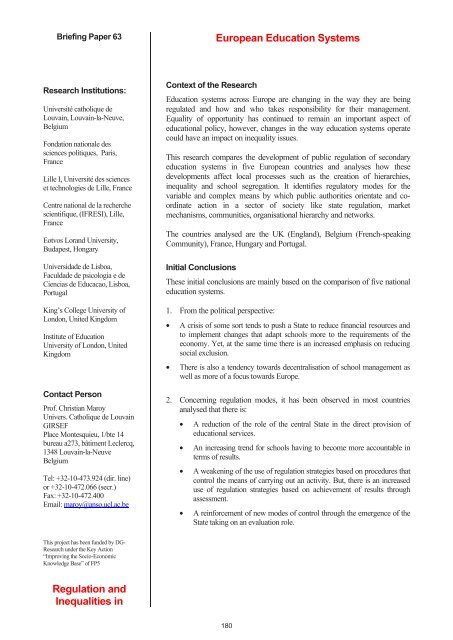briefing papers for policy makers
briefing papers for policy makers
briefing papers for policy makers
Create successful ePaper yourself
Turn your PDF publications into a flip-book with our unique Google optimized e-Paper software.
Briefing Paper 63<br />
Research Institutions:<br />
Université catholique de<br />
Louvain, Louvain-la-Neuve,<br />
Belgium<br />
Fondation nationale des<br />
sciences politiques, Paris,<br />
France<br />
Lille I, Université des sciences<br />
et technologies de Lille, France<br />
Centre national de la recherche<br />
scientifique, (IFRESI), Lille,<br />
France<br />
Eotvos Lorand University,<br />
Budapest, Hongary<br />
Universidade de Lisboa,<br />
Faculdade de psicologia e de<br />
Ciencias de Educacao, Lisboa,<br />
Portugal<br />
King’s College University of<br />
London, United Kingdom<br />
Institute of Education<br />
University of London, United<br />
Kingdom<br />
Contact Person<br />
Prof. Christian Maroy<br />
Univers. Catholique de Louvain<br />
GIRSEF<br />
Place Montesquieu, 1/bte 14<br />
bureau a273, bâtiment Leclercq,<br />
1348 Louvain-la-Neuve<br />
Belgium<br />
Tel: +32-10-473.924 (dir. line)<br />
or +32-10-472.066 (secr.)<br />
Fax: +32-10-472.400<br />
Email: maroy@anso.ucl.ac.be<br />
This project has been funded by DG-<br />
Research under the Key Action<br />
“Improving the Socio-Economic<br />
Knowledge Base” of FP5<br />
Regulation and<br />
Inequalities in<br />
European Education Systems<br />
Context of the Research<br />
Education systems across Europe are changing in the way they are being<br />
regulated and how and who takes responsibility <strong>for</strong> their management.<br />
Equality of opportunity has continued to remain an important aspect of<br />
educational <strong>policy</strong>, however, changes in the way education systems operate<br />
could have an impact on inequality issues.<br />
This research compares the development of public regulation of secondary<br />
education systems in five European countries and analyses how these<br />
developments affect local processes such as the creation of hierarchies,<br />
inequality and school segregation. It identifies regulatory modes <strong>for</strong> the<br />
variable and complex means by which public authorities orientate and coordinate<br />
action in a sector of society like state regulation, market<br />
mechanisms, communities, organisational hierarchy and networks.<br />
The countries analysed are the UK (England), Belgium (French-speaking<br />
Community), France, Hungary and Portugal.<br />
Initial Conclusions<br />
These initial conclusions are mainly based on the comparison of five national<br />
education systems.<br />
1. From the political perspective:<br />
• A crisis of some sort tends to push a State to reduce financial resources and<br />
to implement changes that adapt schools more to the requirements of the<br />
economy. Yet, at the same time there is an increased emphasis on reducing<br />
social exclusion.<br />
• There is also a tendency towards decentralisation of school management as<br />
well as more of a focus towards Europe.<br />
2. Concerning regulation modes, it has been observed in most countries<br />
analysed that there is:<br />
• A reduction of the role of the central State in the direct provision of<br />
educational services.<br />
• An increasing trend <strong>for</strong> schools having to become more accountable in<br />
terms of results.<br />
• A weakening of the use of regulation strategies based on procedures that<br />
control the means of carrying out an activity. But, there is an increased<br />
use of regulation strategies based on achievement of results through<br />
assessment.<br />
• A rein<strong>for</strong>cement of new modes of control through the emergence of the<br />
State taking on an evaluation role.<br />
180


